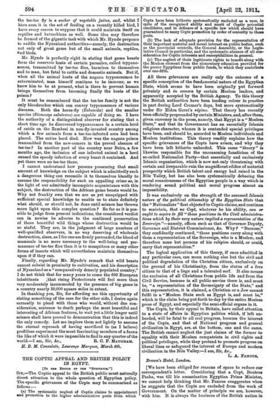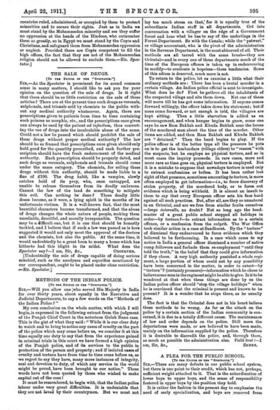THE COPTIC APPEAL AND BRITISH POLICY IN EGYPT.
[To vas EzaTos of nu "SPECTATOR:9 SIS,—The Coptic appeal to the British public must naturally direct attention to the whole question of Egyptian policy.
The specific grievances of the Copts may be summarised as follows
(a) The systematic neglect of Coptic claims to appointment and promotion to the higher administrative posts from which Copts have been hitherto systematically excluded as a race, in spite of the recognised ability and merit of Coptic potential candidates, and in defiance of a specific law which should have guaranteed to many Copts promotion by order of seniority to those posts.
(b) The lack of adequate provision for the representation of their important material and moral interest on public bodies, such as the provincial councils, the General Assembly, or the Legis- lative Council in particular, and the systematic absence of all con- sideration for Coptic interests and susceptibilities in general.
(c) The neglect of their legitimate rights to benefit along with the Moslem element from the elementary education provided for the poorer Egyptians from public funds, to which they contribute over one-fifth.
All these grievances are really only the outcome of a specific conception of the fundamental nature of the Egyptian
State, which seems to have been originally put forward privately and in camera by certain Moslem leaders, and apparently accepted by the British Agency. To this theory the British authorities have been lending colour in practice
in part during Lord Cromer's days, but more systematically under Sir Eldon Gorst's regime. That theory has recently been officially propounded by certain Ministers, and, after them,
given currency in the press, namely, that Egypt is a "Moslem State," and that its Government has an essentially Islamic religious character, whence it is contended special privileges have been, and should be, accorded to Moslem individuals and Moslem institutions. This theory readily explains how the specific grievances of the Copts have arisen, and why they have been left hitherto unheeded. This same "theory" is likewise responsible for the unreasoning fanaticism of the so-called Nationalist Party—that essentially and exclusively Islamic organisation, which is now not only threatening with certain and irreparable ruin the magnificent edifice of material prosperity which British talent and energy had raised in the Nile Valley, but has also been systematically debasing the
moral consciousness of the Egyptian people in a way which is rendering sound political and moral progress almost an
impossibility.
It was exclusively on the strength of the assumed Islamic nature of the political citizenship of the Egyptian State that the " Nationalists "first objected to Coptic claims, and continue to maintain, that no Copt, whatever be his ability, can or ought to aspire to fill "those positions in the Civil administra. lions which by their very nature implied a representation of the Sovereign "—namely, offices such as that of Governor Deputy,
Governor and District Commissioner, &e. Why P "Because," they confidently continued, "these positions carry along with them a representation of the Sovereign, who is a Moslem, and
therefore none but persons of his religion should, or could, carry that representation."
The logical application of this theory, if once admitted in any particular case, can mean nothing else but the civil and political degradation of the Christian citizen, exclusively on
the ground of his Christianity, from the status of a free citizen to that of a liege and a tolerated serf. It also means the exclusion of all Christians from public life and from the Civil Service, because in all public service there is, and must be, " a representation of the Sovereignty of the State," and this representation, it is claimed, a Christian or a Jew cannot fulfil in a "Moslem State such as Egypt is, and must be," which is the claim being put forth to-day by the entire Moslem press of Egypt, and especially the semi-official organs in it.
The Copts, by their appeal to Britain, have called attention to a state of affairs in Egyptian politics which, if left un- heeded, will be fatal to all real progress, because the interest of the Copts, and that of National progress and general civilisation in Egypt, are, at the bottom, one and the same. The British cannot neglect the just claims of the former to equality with their Moslem compatriots in civil rights and political privileges, while they pretend to promote progress on liberal lines or safeguard the interest of Europe and modern civilisation in the Nile Valley.—I am, Sir, &c.,
L. A. FAN0178.
Brown's Hotel, London.
[We have been obliged for reasons of space to reduce our correspondent's letter. Considering that a Copt, Boutros Pasha, was till his assassination Egyptian Prime Minister, we cannot help thinking that Mr. Fanous exaggerates when be suggests that the Copts are excluded from the work of Government. On the matter of principle we are, however, with him. It is always the business of the British nation in
countries ruled, administered, or occupied by them to protect minorities and to secure their rights. Just as in India we must stand by the Mohammedan minority and see they suffer no oppression at the bands of the Hindoos, who outnumber them so greatly, so in Egypt we must stand by the Copts and Christians, and safeguard them from Mohammedan oppression or neglect. Provided there are Copts competent to fill the high offices, the fact that they are not of the Mohammedan religion should not be allowed to exclude them.—En. Spec- tator.]







































 Previous page
Previous page